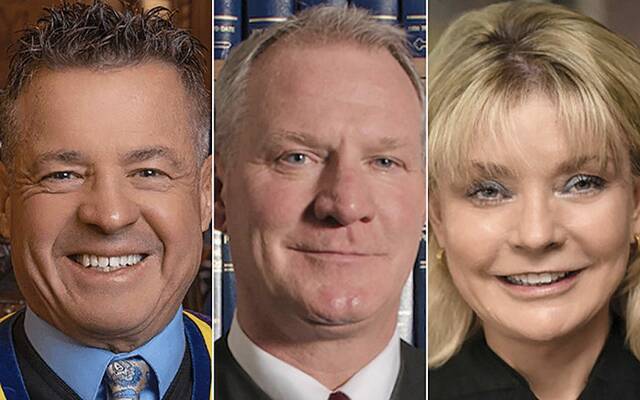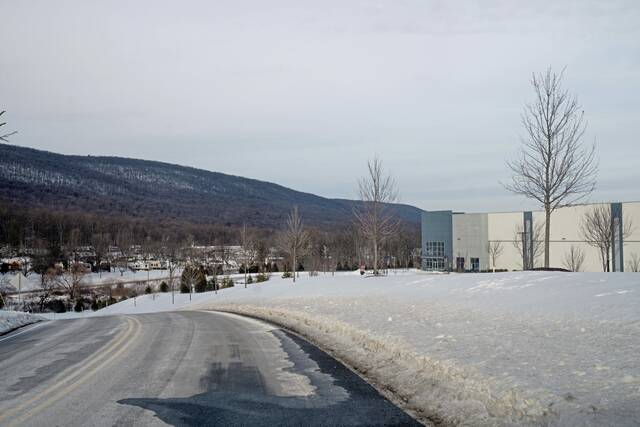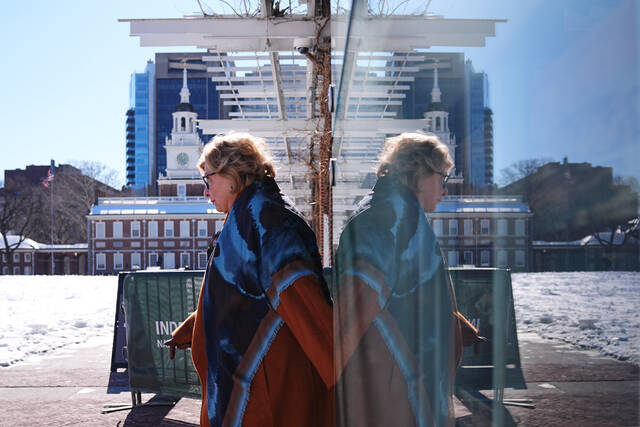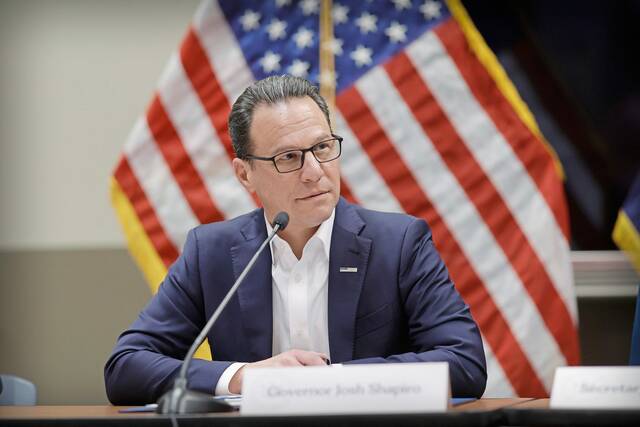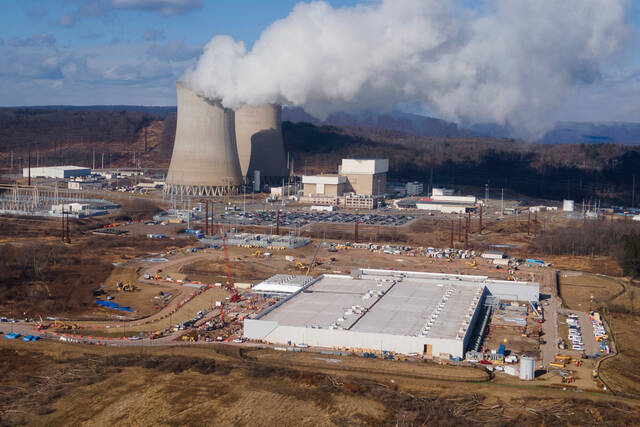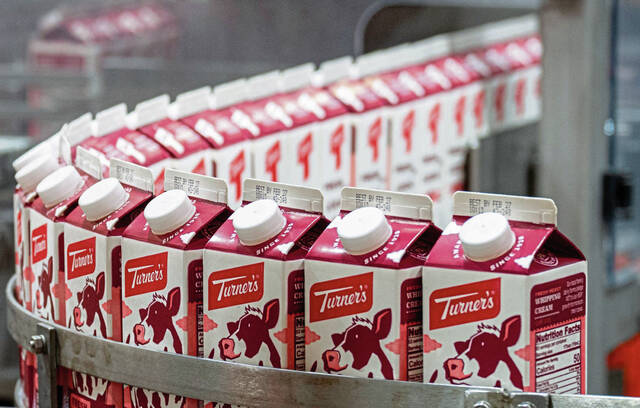When the three state Supreme Court justices on November’s ballot initially ran for a spot on the bench 10 years ago, it was highly partisan and the most expensive judicial race in American history.
Running for retention 10 years later, they hoped, would be different.
It is not.
Justices Christine Donohue, Kevin Dougherty and David Wecht have been targeted by Republicans hoping to remove the three Democrats from the state’s highest court, clearing the way for their party to possibly take a majority during the next election slated for 2027.
The concerted vote-no effort by Republicans paints the three justices as partisan, accusing them of legislating from the bench and basing their decisions on their desired outcomes instead of the law.
But Douglas Keith, the deputy director of the Judiciary Program at the Brennan Center for Justice at New York University who has been following the retention race closely, said there is no clear pattern from these justices, despite sharing the same party.
“It’s hard to characterize the Pennsylvania Supreme Court ideologically,” Keith said.
Although there is a 5-2 Democratic majority, he said, the voting decisions are often splintered.
“These three justices are often not siding with each other,” he said. “It’s a court where the majority in any particular opinion often changes, and it’s not with the partisan label.”
In interviews with TribLive, all three justices said they base their decisions on their interpretation of the Pennsylvania Constitution and the facts before them.
While they often praised the same decisions in talking about their accomplishments, Donohue, Dougherty and Wecht also talked about other parts of their work that they say is critical to the commonwealth.
Justice Christine Donohue
Christine Donohue, 72, of Pittsburgh was born in Schuylkill County and raised in Carbon County, the daughter of a coal miner and a seamstress. She went to college at East Stroudsburg University — where she delivered this year’s commencement address — and attended law school at Duquesne University.
Donohue spent 27 years in private practice as a civil trial lawyer and litigator before beginning her career as a jurist on Pennsylvania’s Superior Court. She spent eight years there before being elected to the state Supreme Court in 2015.
Donohue trumpets the work she and her colleagues have performed over the past decade.
“We have really given due deference and attention to the Pennsylvania Constitution,” she said.
Donohue praised the document and the protections it provides — more, she said, than the U.S. Constitution.
“I’m rather adamant about the correctness of the approach we as a court have taken toward the Constitution of Pennsylvania,” Donohue said. “If it’s dormant, we aren’t doing our job.”
Donohue touted several decisions she and her colleagues have made, including enforcing Pennsylvania’s Environmental Rights Amendment, Equal Rights Amendment and Free and Fair Elections Clause.
Regarding environmental rights, Donohue said: “We decided it meant what it said. Citizens are entitled to clean air and clean water.”
She also cited the court’s work on Pennsylvania’s Equal Rights Amendment, which she said lay dormant from 1986 until the court’s 2024 decision on Medicaid-funded abortions.
“We put that back on track,” Donohue said. “You can’t abridge rights based on sex.”
Donohue also talked about the court’s decisions in drawing congressional maps. The map in 2017, she said, was “ridiculously drawn.”
The court’s opinion sent the issue back to the Legislature, which refused to draw a new map. So the court handled it, Donohue said.
And, she continued, “it worked as it should. That’s how a fair map works in a state like Pennsylvania, which truly is purple.”
In addition to the work she’s done in deciding cases before the court, Donohue also mentions changes their bench has made to diversify the committees and boards they work with.
The court has made an effort, Donohue said, to also improve geographic diversity, including members from across the state, including rural areas.
“Our boards and committees in this administrative work are [now] much more reflective of Pennsylvania at large,” she said.
Like her colleagues on the ballot, Donohue believes the structure of judicial retention elections is supposed to promote stability in the courts.
“Our constitution is designed to have truly nonpartisan judicial retention elections,” she said.
But that’s not what’s happening. While there’s nothing wrong with criticizing court opinions, she said, “What is not OK is twisting opinions because you disagree with the outcomes.”
The goal of a retention vote, Donohue continued, is to judge the quality of the candidate’s judicial performance — whether they are abiding by their oath and upholding the constitution.
This year’s retention fight, she continued, has turned into a continuation of the highly partisan 2015 court election.
“My fear, honestly, is that we’re never going to go back to the way it was,” she said. “It is frustrating, yes, but in a bigger sense, it saddens me because this should never be where we are.”
Donohue said outside interests — and big-money donors — should not be deciding the makeup of the state Supreme Court.
“The independence of our judiciary is on the line,” she said.
Over the last 10 months traveling across the state to talk about the upcoming retention vote, Donohue said the people she has met want to know about her history and how the law can affect them.
“The silver lining of the election is we get to explain what we’ve been doing for 10 years,” she said. “Without this, we would not have been able to explain to a lot of Pennsylvania of what our court has done and what Pennsylvania’s Constitution means and how strong it is.”
Justice Kevin Dougherty
Kevin Dougherty, 63, of Northeast Philadelphia grew up in a blue-collar, working-class neighborhood. He was the first in his family to go to college, attending Temple University before law school at Antioch in Washington, D.C.
He began his legal career as an assistant district attorney before going into private practice.
Dougherty won his first judicial election in 2001, becoming a Philadelphia Common Pleas Court judge. He remained in that position until winning a seat on the Pennsylvania Supreme Court in 2015.
Dougherty has been part of decisions enforcing environmental-protection laws, fair elections and those that have declared unconstitutional the state’s public education funding scheme and the City of Pittsburgh’s facilities usage fee (known as the “jock tax”).
He called the heavy criticism the court received on the 2018 gerrymandering case “nonsense.”
“Our court ruled the current map was unconstitutional,” he said. “We served it back to the General Assembly to have them create a nonpartisan map. When they abdicated that responsibility, we must step into that void.
“The state constitution mandates a fair and equal election.”
In other cases that have drawn criticism, Dougherty said, the justices based their decisions on their interpretation of the statutes at issue.
“We are making a decision based on the law and the facts before us,” he said — not partisanship.
“The moment we put our hand on that Bible, we have to hang up our partisan ideals.”
That’s why, Dougherty said, he is frustrated by the state of the retention race — and the concerted effort by a heavily funded opposition — to vote them out.
“If this is just for a yes or no vote, imagine what it will be like,” he said.
“I think that’s detrimental to the commonwealth,” he said.
In addition to praising the court’s jurisprudence, Dougherty referenced its efforts to improve access to the public, especially for mental health and autism awareness.
When Dougherty was a Common Pleas judge, a person with autism came before him. He said he made it his goal to learn more about how to help neurodivergent people navigate the court system.
“I’m now able to do that at the state level,” he said.
Over the past year traversing Pennsylvania, Dougherty said, he has been distressed to find few people know who is on the state Supreme Court or why the work is so important.
“Every decision has an impact on 13 million Pennsylvanians,” he said.
The work the court has done, Dougherty said, has impacted child welfare, workers compensation, custody and countless other areas.
“Each day we’re in session, each opinion we write, it’s going to affect the entire state of Pennsylvania.”
Justice David Wecht
David Wecht, 63, of Indiana Township grew up in Pittsburgh’s Squirrel Hill neighborhood. His late father was the famed forensic pathologist Dr. Cyril Wecht; his mother, Sigrid Wecht, is an attorney.
Following undergraduate and law school at Yale University, Wecht served as a law clerk on the U.S. Court of Appeals for the D.C. Circuit in Washington, D.C.
He later returned to private practice in Pittsburgh before being elected to Allegheny County Common Pleas Court in 2003.
Wecht worked as a family court judge before his election to the Pennsylvania Superior Court, where he served for four years prior to being elected to the state Supreme Court.
He is passionate about his work.
“I love reading the law. I love writing about the law. I love analyzing the law,” he said.
Like his colleagues, Wecht talks deferentially of the state constitution.
“In our 10 years on the court, we have decided cases vindicating peoples’ rights under the Pennsylvania Constitution when they would have no rights under the U.S. Constitution,” he said.
It’s why the state Supreme Court is so important, Wecht continued, listing five reasons the justices on the ballot ought to be retained.
First, when they were initially elected to the bench, Wecht said, the Pennsylvania Supreme Court “had become an embarrassment.”
Two justices resigned because of scandal, and one had been convicted of a crime.
The court, Wecht said, was plagued by acrimony and bitterness.
“Voters of all parties — or no party — ought to be proud of the court they have now,” he said. It is a court that functions “in good-faith fashion, without rancor.”
Next, Wecht noted the congressional map case in 2018 that ended “the most obscene, gerrymandered House map in the nation.”
Third on the list, Wecht continued, is the court’s decision that determined the state’s public school funding system was unconstitutional.
Fourth, he cited the court’s majority decision that enforced Pennsylvania’s Environmental Rights Amendment.
And last, Wecht cited the decision last year that said the state’s Medicaid program has to fund reproductive rights for men and women equally.
“We gave it life and ensured women have equal access to health care,” he said.
Wecht called the notion the three justices up for retention always vote in lockstep “totally absurd.”
“I don’t care who wins or loses. I just care about getting it right.”
Wecht said the court’s opinions are usually fractured.
“If you try to chart a through line of partisan (decisions), you’d be hard-pressed,” he said. “It’s crazy anyone would say our decisions are driven by partisan politics.”
Wecht believes the current state of retention elections doesn’t foster the appropriate dialogue for a judicial race — which ought to be addressing the merits of the justices’ ethics, integrity and fitness to be a jurist.
“It, obviously, signals the potential — if not the likelihood — of an arms race in these retention elections,” he said.
Big money and partisan actors, Wecht said, are “disturbing the vision of the founders.”
He suggested, if all three lose retention, there would be gridlock in the court — along with a huge waste of time, effort and expense among the parties that appear before it.
The court’s decisions, Wecht said, establish precedent that endures for decades.
“I think the people of Pennsylvania are entitled to that depth of breadth and experience.”
Decisions of note
2017


